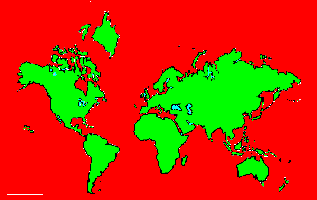SPECIES INFO
Albacore tuna (Thunnus alalunga) is found worldwide in warmer and tropical oceans. However, it is more common in the Pacific Ocean than in the Atlantic Ocean. The very long pectoral fin will help identify this species. This fish can reach over 4 feet in length and weigh over 90 pounds. This is the fish that is most frequently sold in cans in grocery stores as "Tuna". There is a nice color drawing of this species on page 74 of the Diamond handbook on fishes of Britain and Europe.The mackerels and tunas (family Scombridae) are found worldwide in warm and tropical oceans. These are larger marine fish that travel in schools. There are probably about 47 - 75 species in this family. These fish are fast swimmers and include many commercially valuable species. The larger members of this family can be up to 14 feet long. It has been estimated that schools may cruise at over 30 miles per hour.
In July 2011 the IUCN (International union for conservation of the earth's plants and animals) announced that most species of tuna are in urgent need of protection. The Atlantic blue fin is now officially endangered. They note that five main species make up the annual worldwide catch of over 4 million tons:
Skipjack (katsuwonus pelamis) - 60 percent
Yellow fin (Thunnus albacares)- 24 percent
Big Eye (Thunnus obesus) - 10 percent
Albacore (Thunnus alalunga) - 5 percent
Atlantic bluefin (Thunnus thynnus) - 1 percent
They observed that modern open water fishing technology has depleted world wide open water fishes by up to 90%.
Perch-like Fish, Order Perciformes, are the largest order of fish in both freshwater and shallow saltwater. Most of the conventional fish belong to this order. The bass, bluegills, perch and crappies of freshwater plus the groupers and sea bass of salt water belong to this order. The fish all have spiny rays in their fins and the tail fin has seventeen rays. There are approximately 150 families. Herein, we have placed the families in alphabetical sequence within this order. (In some instances the typical taxonomic sequence of families is not much help. Consider, for example, that the barracudas are usually placed between the mullets and the threadfins.)
Bony fish, Class Teleostomi, are a class of chordates that include the majority of fish-like animals found on earth. They are characterized by a bony jaw and a bony skeleton. They are found in both fresh and marine waters.
Backboned Animals (Phylum Chordata) are the most advanced group of animals on earth. These animals are characterized by having a spinal cord or backbone. Most members have a clearly defined brain that controls the organism through a spinal cord. Fish, amphibians, reptiles, birds, and mammals are in this phylum.
Currently, some taxonomists believe that the fish should be divided into two groups (sharks and regular fishes) and that there are some other primitive groups in the phylum such as hagfish or lampreys.
Animal Kingdom contains numerous organisms that feed on other animals or plants. Included in the animal kingdom are the lower marine invertebrates such as sponges and corals, the jointed legged animals such as insects and spiders, and the backboned animals such as fish, amphibians, reptiles, birds, and mammals.

